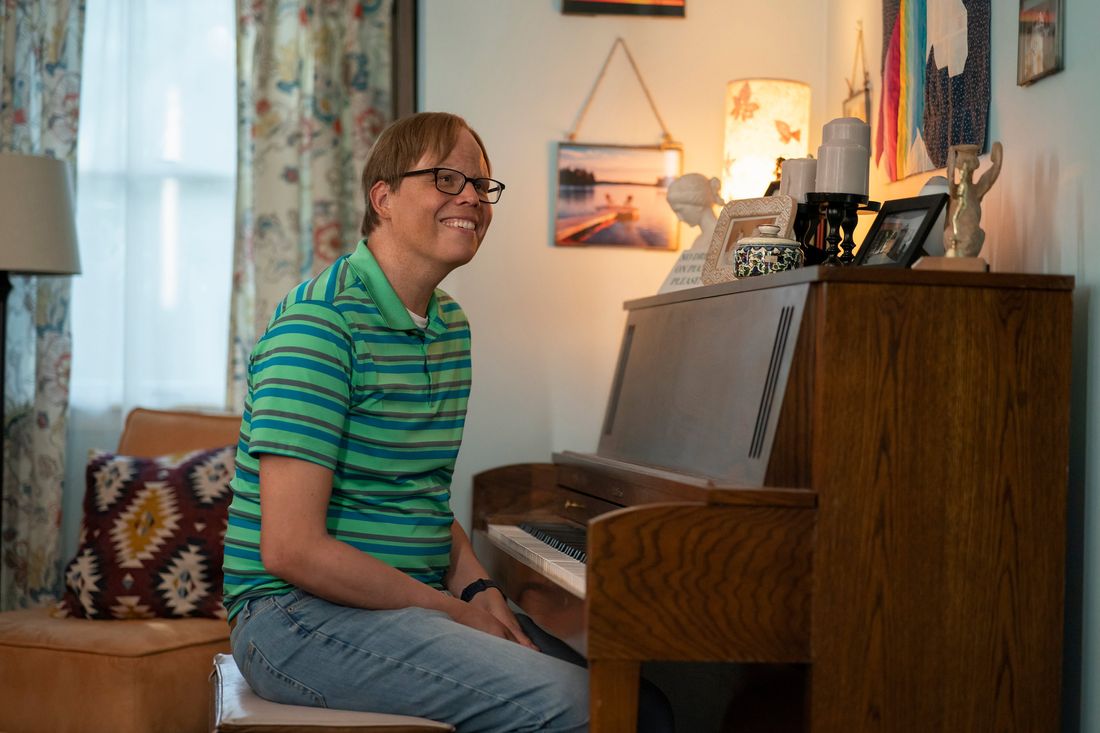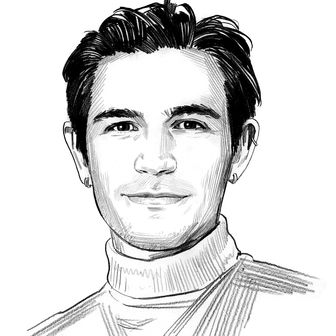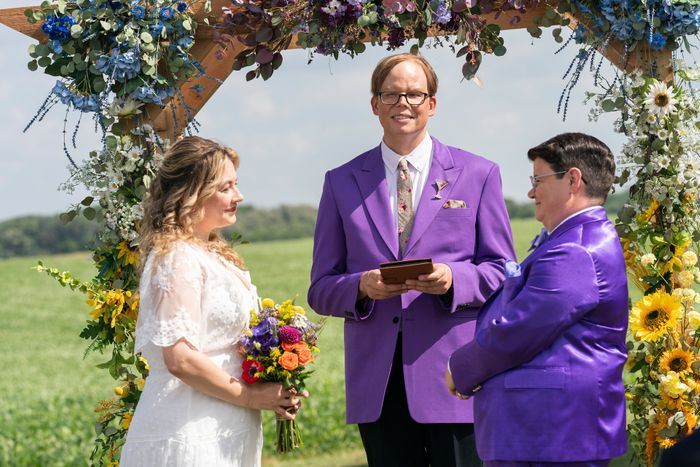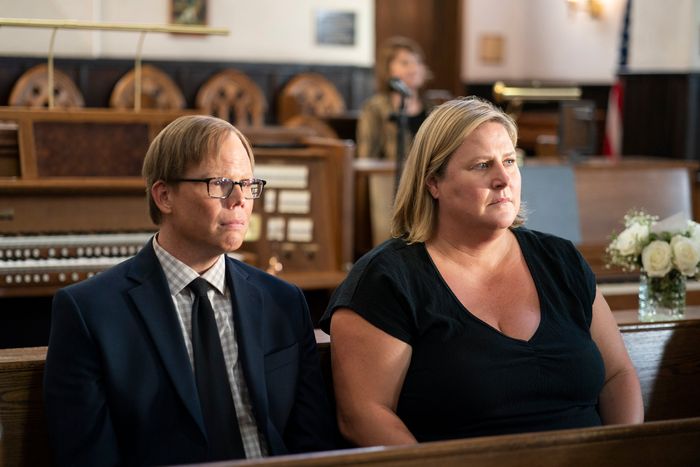
Last Sunday, Somebody Somewhere aired its second season finale, following Succession and Barry’s final bows. While its sister shows on HBO trade in bombast and high stakes, Somebody Somewhere asks its audience to engage with something they might actually be going through. Sans boardrooms and murderers, Somebody Somewhere is set in Manhattan, Kansas, where change is slow, the heartbreaks are acute, and the comedy is conversational. Over time, the show has evolved from a story about Sam (Bridget Everett), who returns home to Kansas in the wake of a family tragedy, to a two-hander between Sam and her best friend, Joel (Jeff Hiller). A gay man constantly struggling with his relationship to religion, Joel is something of an anomaly on TV: bitchy and funny but also earnest and vulnerable.
Season two began with Sam and Joel completely in sync, but by the end, Joel’s need for emotional connection has led him toward a romance with a man he’d previously made fun of with his best friend. The resulting fallout leaves both Joel and Sam adrift emotionally, and their reconciliation in the finale underlines something that sitcoms are typically loath to acknowledge about their central relationships: that the connection between them has changed. Following a finale that puts both the bitter and the sweet in bittersweet, Hiller reflected on Joel and Sam’s season two journey from codependency to wistful reconnection, and why, as he notes, “the truth is that their relationship can’t be the same.”
For all of the positioning of what the wedding speech in the finale meant religiously for Joel, it was very nondenominational. What do you see as his connection to the idea of that speech?
When he had that scene in Fred’s office, when Fred says, “It isn’t about God. It’s about me,” that really stung him. He was making it all about himself, and it was really about these other people. That was a realization for him, especially because he prides himself on being this person who loves people and is such a good friend. He was having a real selfish moment.
I saw it as a speech about Fred but also a speech reaching out to Sam.
That was a big part of it too. The farm stuff was for Fred. And the part when he says, “We show it with our emotions and in our actions, but right now, we want to say it. We want to say, ‘We love you. We love your love,’” — that’s important for Joel. It’s played as a joke in season two that he says it to Sam so often while she’s not into it. But it’s important for him to say to Fred and to welcome Susan, because he wants her to feel welcome. It’s about the trans stuff too. You know, we love your love. This isn’t the most tolerant community. “It’s an intolerant community at times, and I want you to know that the people here gathered at this farm — we love your love.”
The speech felt very obviously inspired by what Joel had learned over the course of the season in regard to change. Is that something he’s conscious of?
I was conscious of it. That script came late, it was a three-page monologue, and it was a little too meandering. I never do this, but I went to the writers and was like, “Can I change it to be just a little bit like this?” And they were receptive to some changes and not to others. That’s why they’re the writers!
What did you change?
I put in the word change. They wanted it to be a bit more opaque. I said, “Sometimes change can be good.” I wanted it to be a little for Sam. Maybe I’m too obvious, but that’s what I wanted.
What does he want her to know?
The entire series is all about her growth and fear of change. It’s the promise of the premise. He wants her to know that stasis is wrong. Stasis in being sad is not good for you. You’re in a codependent relationship that is not healthy for you either. They had this beautiful honeymoon that they enjoyed, but they both need to grow. They need to change. Joel has that vision board for a reason. He knows that growth and goals are important. Sam is afraid of that.
The codependency point is really interesting. I’ve been describing the season as an explosion of the Will & Grace archetype.
I’m a total Eric McCormack. We’re the same.
You’re straight playing gay?
Yeah. Tell my husband.
But there is this archetype of the gay guy and the straight, cisgender woman in a codependent friendship. With this season beginning with a strong connection between Sam and Joel that later curdles, it felt like they tricked me into assuming it was a sitcom world where nothing changes. But then things change.
Do you remember the Sex and the City movie? When it came out, I remember Sarah Jessica Parker was like, “The beginning of the film is like a delicious cream. Then it becomes a tragedy.” I think it is important to see the delicious cream to make the audience feel like this is fun, because Sam and Joel are feeling that this is fun. You have to enjoy that part in order to understand why they’ve fallen into that rut.
The writers are really smart. Hannah Bos, Paul Thureen, and Bridget too. Bridget is in the room every single day, and she’s actually gotten credit for scripts this season, but she was in the room every single day for the first season too. She’s willing to be vulnerable and raw. She has talked about how she has been in these beautiful platonic romances, and they always change. That is not something you see on TV. The only time I can ever think of it being portrayed is that movie Walking and Talking with Anne Heche and Catherine Keener.
But even then, it’s a movie. You don’t have to serialize the aftershocks.
Exactly. And that’s why we really need a season three. Everyone, please write in, so we can do that.
Can you describe the rut that they’re in? What’s the issue?
I’m using these, like, romantic-relationship words, but they’re so in love with each other.
I don’t think that’s wrong.
Yeah. They’re so in love with each other, and I’ve been in those kinds of relationships too, where you have your one person that you go to for everything. Especially with Fred being gone, they became completely enmeshed and unable to let anybody else in. She makes it into a little acronym of NNP (“no new people”), but that’s not healthy. You want to have new people, continue growing, and have a community. Otherwise, you have what ends up happening to Sam in episodes five and six, when she has this gut punch from her sister. Then she has this gut punch from Joel. She’s completely alone eating eggs Benedict.
It all goes back to growth. She’s so afraid of it. That’s why that scene in her house, when we’re making up and Sam has that great speech, is so beautiful. She was writing it literally the night before in her trailer, making it seem like it came from her mouth, and it wasn’t cheesy but vulnerable.
Sam and Joel get back together in the finale, but it doesn’t feel the same. It’s not the same relationship. How do you think it has changed?
There’s this third wheel named Brad! Once Joel is in a romantic relationship, that takes a lot of time and effort, which means you can’t always be watching some sort of weird sex show where we see a dick. You don’t have the time.
In the script for episode seven, when Joel and Brad pick her up, I’m in there giving her shit for flirting with her neighbor. Then she becomes annoyed and says, “Okay, can we just drive?” That’s such a wonderful way to say she’s still here and not estranged from Joel, but it’s not easy.
The finale is bookended by two Christian rites of passage — the funeral, then the wedding. I was curious about Joel’s relationship to both of those things now, given his connection to Christianity throughout the season.
First of all, both of those things happen in a lot of people’s lives even without faith. For him, the funeral is in a church, and it feels safe and normal. He’s not really close with Darlene, but he wants to tailor the wedding to Fred and Susan. He does still see it as holy. I don’t think he’s done with church forever. I think he’s wrestling with this moral decision about deceiving his pastor, who is nothing but kind and warm. He’s embarrassed to be around God, and that’s why the wedding was so scary. When Brad says that the church is the place you go when you have a lot of questions, that’s a freeing thing for Joel to hear.
There’s a moment during the funeral when the priest says, “Imagine your life without music,” and we cut to Joel. He seems very affected by that, and we’ve seen Joel almost completely removed from music this season. What does that take away from him?
If Joel didn’t play the piano and have choir practice, their relationship wouldn’t have blossomed the way that it did. It’s because he had music to get under all those protective barriers. He plays the piano really well, and he organizes his social life around these musical events. His love of Sam is so much about appreciation for her gift and wanting to nurture it. We don’t necessarily see it, but he probably plays his piano when he’s bummed. He’s the kind of person who always has a song in his head.
I don’t think I’ve ever seen a gay relationship developed through a connection to the church on TV before. What do you think of that choice?
I know two lesbian couples who met in a faith community. For me, growing up, our entire social life was built around the church and, after college, I was a volunteer at this place called the Urban Servant Corps, which was like a faith-based AmeriCorps. It was super-progressive and super-lefty. There were a lot of queer people who went to churches there. I definitely went to church looking to meet somebody.
But I don’t think I’ve ever seen it on TV before.
Completely. Oh my God, gay plus church equals oppression on TV. This is a world I’m very familiar with that I’ve never seen on TV.
It’s asking audiences to hold two things true about the church in their heads at once. Which gets very scary.
I’m not trying to be like, “Everyone should go to church.” I don’t go to church! There are a lot of really shitty churches — especially toward the queer community, especially right now. But there are these really beautiful, progressive churches, and it’s interesting to see that intentional justification.
Sam and Joel’s relationship is so fun for the audience to be a part of, but “Will and Graces” tend to be a little bitchy, and Sam and Joel are no exception. I was wondering about Joel’s relationship to earnestness, because that seems like something he gets from Brad that he doesn’t get from Sam.
The thing about Joel — and Jeff — is that both things can be there at the same time. I am certainly more earnest than Bridget. I am someone who can really believe. That’s why I loved church growing up. I loved that earnestness. But at the same time, if you don’t have anything nice to say, come sit next to me! But also, when Sam says a cutting comment, she maybe believes it more than Joel does.
It felt significant that the person he ends up with is someone they made fun of.
When I first read the scripts, I thought they were fooling us. I did not consider this, but what you’re saying is so true. Brad gives him something that he can’t get from Sam. I think making fun of him was practice for opening his heart to someone he wouldn’t have even considered. Even the fact that he made this weird food that made them sick — it caused his humanity to become real to Joel.
Because Sam and Joel are our POV characters, the audience went on the same journey as Joel did with Brad. So at first, you’re like, Oh, this guy’s a funny little side character. Then, as he becomes real, you start to care more for him.
The writers did that with Tricia and Joel. At first, when you see Joel, you think, Oh God, he’s a loser. He says, “It’s okay you don’t remember me. A lot of people don’t remember me.” So sad! Then, even the part when he is bitchy is beautiful — it’s unexpected from a TV character, even though, in real life, we are all of these different things.
I was at the Michael Schulman event where you performed Sally Field’s Oscar speech. That had a certain earnestness to it, because Field is so earnest, combined with a skewering.
I am so earnest, but I am willing to skewer. I love Steel Magnolias, Places in the Heart, and Soapdish. Her speech is dumb. When you watch it, it’s cheesy. But then she says, “You like me?” Then I’m embarrassed, because it’s true, and that’s how I feel too. If I won an award, it would feel like someone likes me, and I’m desperate for that.
We’re introduced to “Gloria” as the song that Joel wants to hear at his own wedding. Then it ends up sung by Sam as an olive branch to Joel at someone else’s wedding. What do you think about that recontextualization?
Joel is clearly a music person, not a lyrics person, because there’s nothing about that song that is even slightly about a wedding.
The “Gloria” refrain sounds like a hymn though, doesn’t it?
It does, although I think it’s about just some lady named Gloria.
But that’s why he is so in love with Sam too. It’s not about the words. It’s about the emotion and expansiveness. The real reason the song is “Gloria” is because the actor Jeff Hiller loves the song “Gloria.” I used to play it during season one all the time, so they chose it for that reason. I mean, it didn’t get played at my wedding. I just really like the song. But I don’t think it matters if it was sung for his wedding. It matters that Sam sang that song. Sam’s a “no requests” person, he made a request, and she granted it. That’s why it’s such an olive branch.
This interview has been edited and condensed.




